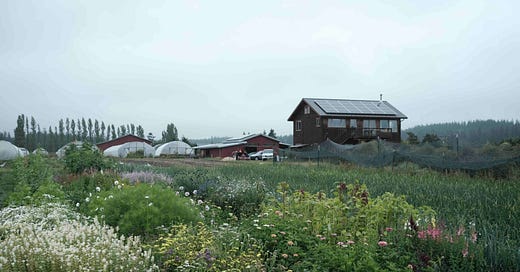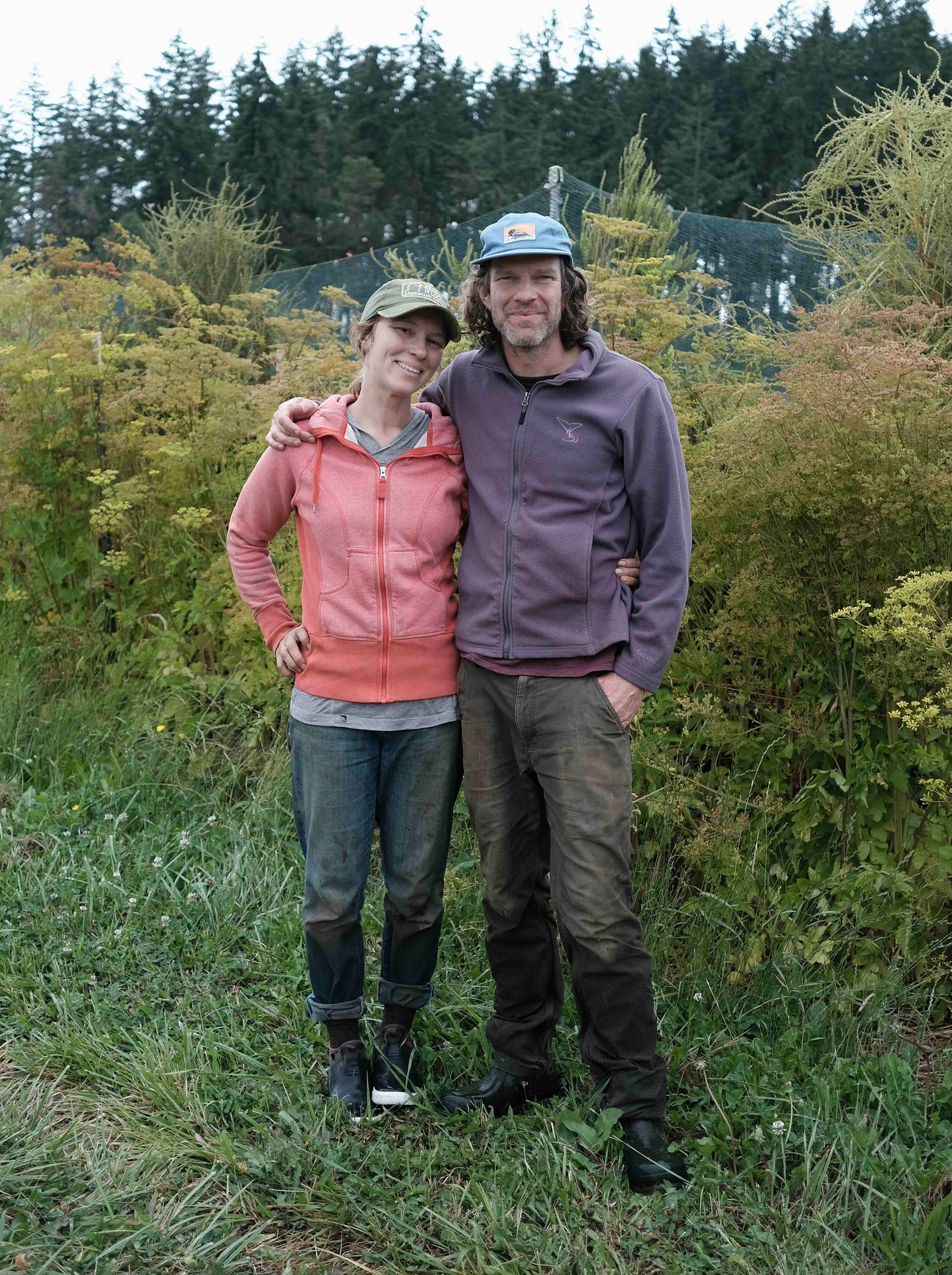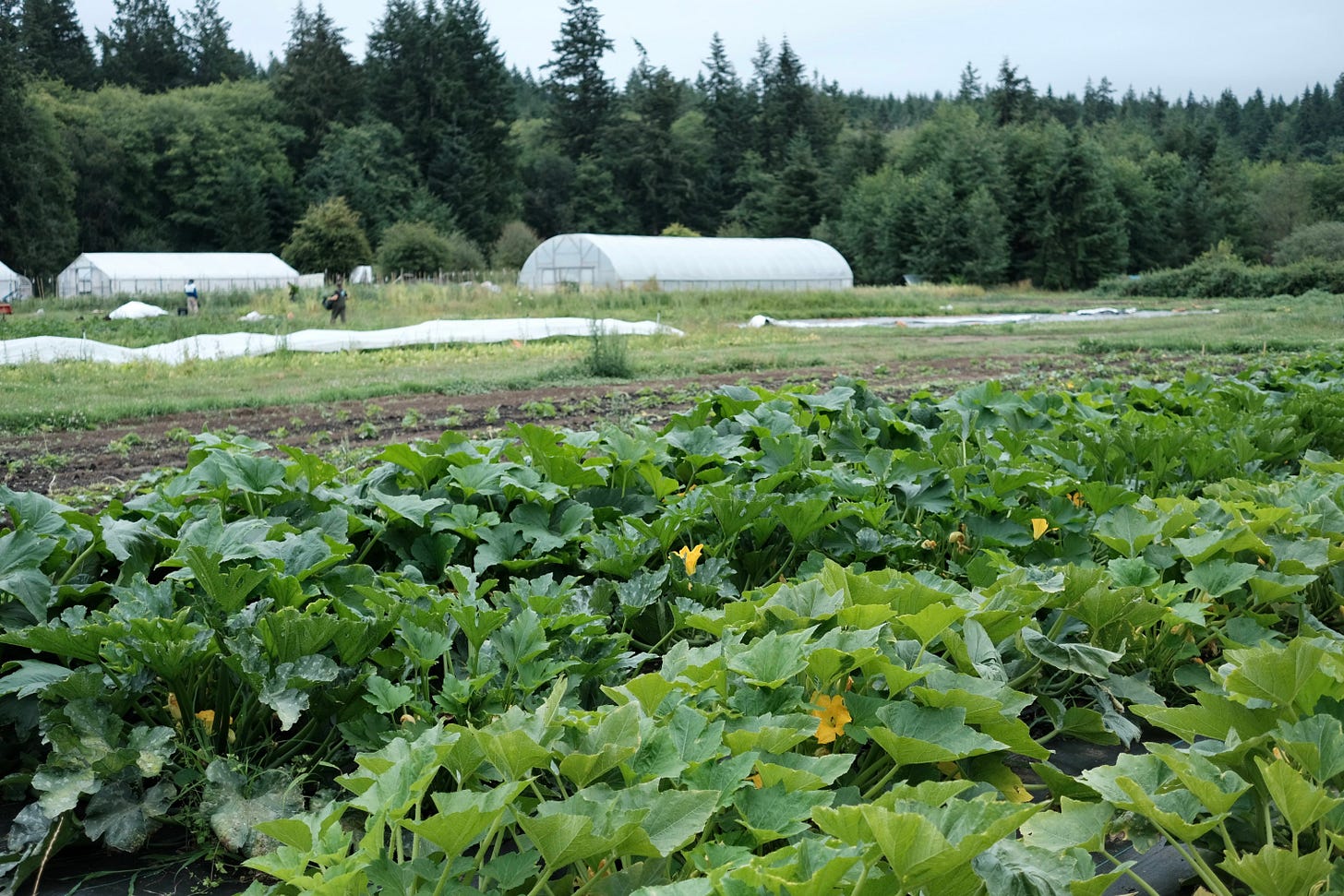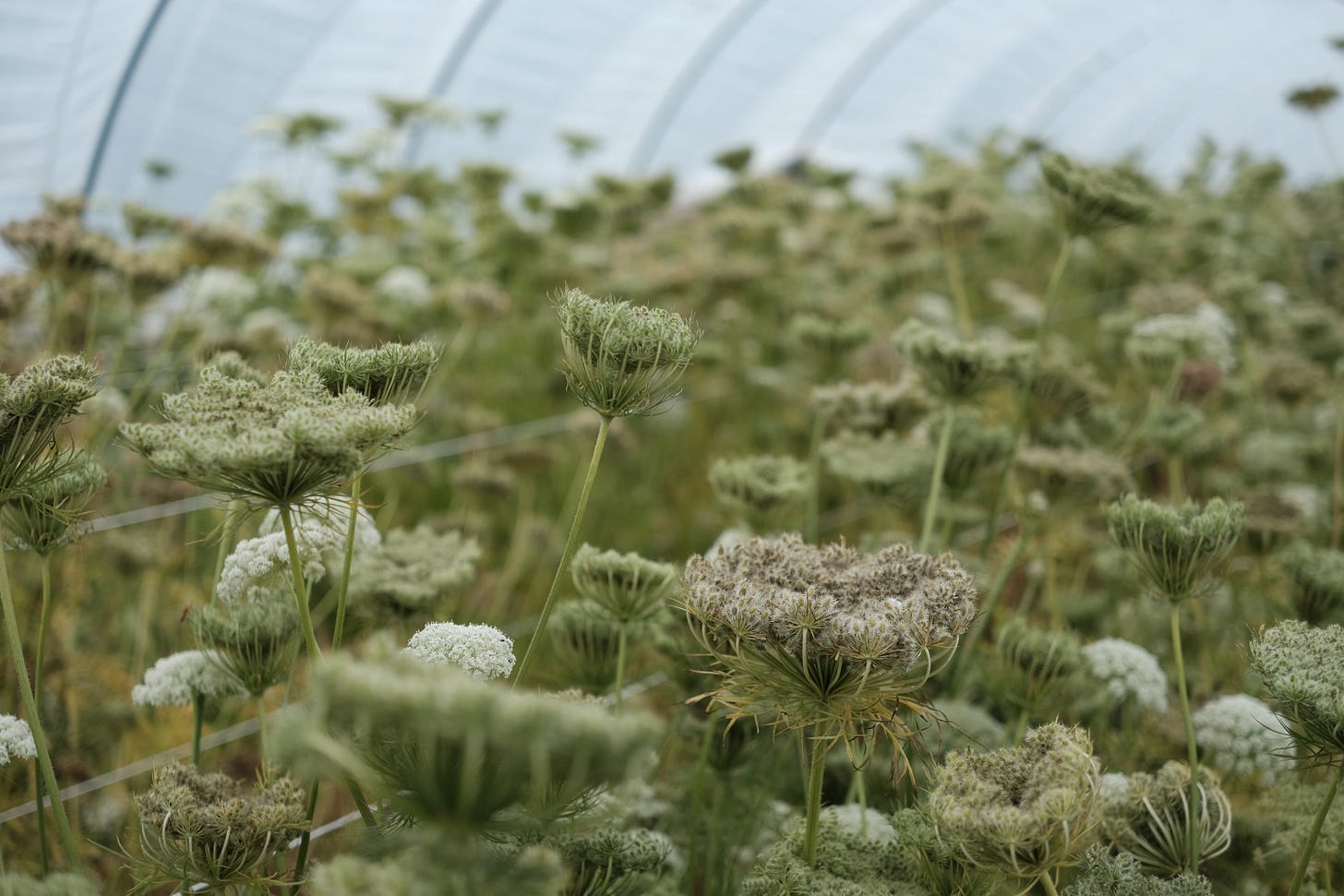In my last week before heading over the border into Canada, I back tracked a little, geographically, with the intention of meeting Annie Jesperson and Nathaniel Talbot at Deep Harvest Farm.
Deep Harvest Farm is a certified organic seed, vegetable and flower farm on Washington State’s Whidbey Island. Annie and Nathaniel have been growing on Whidbey for 13 years, and this is their 8th season on their current plot. Unlike many of the farmers I have visited on my journey so far, Nathaniel and Annie are not only seed growers, but they also run a thriving 100 share CSA. And as well as growing the veggies and seed, they also hold their own seed catalogue: they are essentially a market farm and seed company all rolled into one.
On the day I visited them it was unseasonably wet. When I left on this trip, I was told that sometime in May or June it stops raining in the Pacific Northwest, and no precipitation falls from the sky again until September. As someone who has lived a lot of their adult life in Northwest England, this seemed unfathomable. But, up until now, it had proved accurate. It’s one of the many reasons this is a prime seed growing area – crops can ripen and dry down in situ, they can be harvested and left to further dry out in the field as there is very little chance of rain. Crops getting wet and moulding away on the plants is just not a common thing. But for a couple of (actually, quite joyfully refreshing) days in late July, the skies opened and I found myself stood in the field being pelted by some sideways rain blown in from the Puget Sound. It didn’t, however, stop me experiencing the delights of Deep Harvest Farm.
Deep Harvest Farm is located towards the south of Whidbey Island, a stones throw away from the ocean. 10 acres in size, the farm is a thriving habitat of annual crops, hedgerows, flowering perennials and orchards. Annie and Nathaniel made the decision to leave their city lives in Portland many years ago after catching the ‘farming bug’, and moved to Whidbey Island to attend the Organic Farm School (OFS). They deliberately chose to focus on seed from the start – the OFS at the time held contracts with High Mowing Seeds and taught seed production as part of their curriculum – and it has continued to play a central role in their farming practice.
Nathaniel – ‘I was into conservation biology before farming and I found it pretty slow and slightly demoralising, this receding baseline that you’re trying to fend off the whole time in the natural world. Whereas in farming, these people are actually actively stewarding hundreds of varieties on their own and saving the genetic material that’s out there from going extinct. I was just fascinated by the idea of it from a conservation perspective. I got drawn to seed before I even started farming…the idea of serving biodiversity through farming.’
Working from the premise that a thriving local food system starts with regionally adapted seed, Annie, Nathaniel and team are currently producing upwards of 40 seed crops each season at their farm, alongside bountiful vegetables, salad and herbs for their CSA. They offer around 170 varieties in total of locally grown open pollinated seed in their seed catalogue, growing the vast majority of this themselves, as well as contracting with a selection of other organic growers in the PNW. Within their diversified model of market farm and seed farm, the seed varieties they grow are very much about flavour and suitability for market.
Nathaniel – ‘Us having a market farm in addition to the seed company actually gives us the concept over what we’re trying to do as we’re testing things out on our farm all the time. Being able to test all of our varieties in a market garden context I think is pretty cool. And having that as a credential requirement for a new variety that makes it into the catalogue, I think is pretty unique in a way, to seed companies of our size. Most companies focus on really unique things or rare things or some really cool growing characteristics but not necessarily commercial viability.’
One of the ways they test marketability of each variety is through running variety trials. Each year, Deep Harvest Farm source and trial multiple varieties of flowers and vegetables, often testing multiple strains of one variety (the seed bought from different sources) against each other. They are extremely critical in their selection process, only choosing the varieties that can really deliver in terms of taste, productivity for their CSA and ability to thrive in their challenging climate.
Annie – ‘We are passionate about vigour! We have a lot that we’re working against here, just with pest pressure so that is a high criteria. And the wet and the cold. The slugs are gnarly. And doing the variety trials is probably one of most fun things we do on the farm. Picking them all out, tasting them, choosing one we’re going to pass on to our broader community…feeling like wow we just found a fava that knocked all the rest of them out of the park! It just feels so satisfying.’
Varieties have to earn their place and provide Annie and Nathaniel with a yield sufficient to supply their own community with food. Closing the loop on inputs, they use over 80% of their own seed for their CSA crops, so varieties in the Deep Harvest seed catalogue are tried and tested year after year for their performance in an intense market farm operation. Neither Annie or Nathaniel seemed dogmatic about only using open pollinated varieties - they still rely on some hybrid varieties for their CSA, namely brassicas and spinach – and Nathaniel acknowledged there are just some crops that organic open pollinated varieties aren’t quite there at in terms of vigour and yield. They seemed to have an awareness of the value that can be found in having a diversity of plant breeding methods, and access to that all important germplasm:
Nathaniel: ‘You would think, why does the US need more than 5 carrot varieties? You know, that’s a valid question. And then you do a variety trial, and you test out 20 of them and only 1 of them is really worth growing. And it’s like, wow, I’m glad there were 20 and not 19! Every added variety might be the best choice for a certain bioregion or a certain climate or pest or weather conditions. So, the more options you have, the more adaptability you have to specific conditions, especially when you get into the more marginal growing conditions…like us!’
Like Brian and Crystine at Uprising Seeds, Deep Harvest Farm consider themselves stewards rather than breeders, and work in relationship out in the fields with their crops to ensure the seeds they grow are vigorous and resilient to their marginal maritime climate and relevant to their community. They have, like most folks I have visited, their own breeding projects that they dip in and out of, but for the most part their focus is on the selection process and really getting to know their crops.
Nathaniel – ‘There’s longevity (to seed work), being able to steward something and work on something that’s multiyear and even multi-generational. We, people, pass down varieties to other plant breeders and farmers and keep improving things for the long term, in perpetuity for others that will come after us.’
There was something wonderfully familiar about Deep Harvest Farm, with the market vegetable and seed crops thriving side by side. Like many of the places I have worked back home, there was an abundance of life. It seemed a brilliant demonstration of the value that comes from a diversity of approaches to seed stewardship, in particular the weaving together of food and seed production. The duality of this approach giving Deep Harvest Farm their uniqueness as a seed company.
After my time with Annie and Nathaniel, I drove a little further south to visit the organisation that supported them in their early days of farming: the Organic Farm School. A learning centre for anyone wanting to grow food at community scale, the OFS trains new entrants to develop and manage small farms focused on ecological, economic and social regeneration whilst simultaneously offering opportunities for the local community to learn about their role in strengthening local and regional food systems.
Each year, new students arrive in early spring to begin their intensive residential training programme, and they spend the following 9 months learning the practical, theoretical and business skills it takes to become a food producer.
I was particularly keen to visit OFS as I had heard that seed played a big part in their curriculum. They have been growing seed on contract for some of the larger seed houses for many years, and students play an active role in caring for these crops. When I arrived, the barn was heaving with recently harvested brassica seed waiting to be threshed.
After being welcomed by Judy Feldman, Executive Director of OFS, I was introduced to Jeff Markette, Farm Manager, who gave me a tour of the farm. An experienced farmer and rancher, his lifelong passion for good food was palpable in our conversations. Jeff is responsible for teaching and modelling the practices of regenerative agriculture to students each year, and together with Research Director and Senior Instructor Andrew Corbin, Field Supervisor Mindy Woodward, and Field Assistant Kevin Holton, they bring together the very practical realities of running a farm with the science and research fundamentals to provide students a holistic overview of organic food production. As well as being involved in the day to day running of the farm, students get weekly classes covering everything from the farm finances to exploring cutting edge research in soil biology. And seed is a key part of the curriculum:
Jeff - ‘For our students, to see in what we’re doing, through the broad diversity of everything we’ve got going on here, that there are lots of ways to be a farmer and seed growing is one of those ways you can do it. And, as we see with climate change and how important it is to have our own staple food in our own climates and bioregions, how important it is to have seed that is diversified and also local to that region. We see, sometimes when we buy from a large seed house and when we buy local, the germination rates are wildly different, even though it’s like 98% (on the packet), yeah maybe that’s 98% in Georgia but it’s not here so I think that’s where it’s important.’
The farm school are currently growing several seed crops on contract, and have been involved in many variety trials over the years with connections to the Organic Seed Alliance and various public breeding programmes. By including seed stewardship and trials in their curriculum, they hope to demonstrate to students why this diversity is so vital in our food system.
Jeff - ‘I think that diversity in seeds is super important: we talk about losing lines of seeds - they’re becoming homogenous and it’s all going in one direction. Bringing back the diversity for eaters, for growers, for seed people and just broadening back to what food used to be, and looking at what food is now – trying to widen that scope a little bit.’
Along with the seed work, the OFS strive to expose students to as many farming skills as possible throughout their core training programme. During their time at the school, students are responsible for all aspects of farm management, from harvesting and weeding vegetables, to wash/pack, to caring for livestock, to cutting hay. OFS is a working farm, and all the produce grown and raised there is sold to local businesses and via a weekly farm stand, with students in charge of sales . As well as welcoming locals to the farm stand each week, they also host the weekly Farm Friday Community Pot Luck, sharing food with members of the wider community with an emphasis on local seasonal eating. Through regularly opening their doors, students have the opportunity to share and celebrate their important work: strengthening the food system through community. Making connections, forging relationships.
Jeff - ‘I do what I do, specifically farming with these students, because I get to come into work every day and it’s like a challenge, and every day farming is a puzzle and we’re trying to figure out what puzzle pieces go where. And I get to come to work with really passionate excited exuberant people that really want to be here, and we’re all doing that together and its super fun. And giving people food here at our farm stand and that connection – people are going to take this product home and they get to feed themselves or their family or friends. I love food, food is such an amazing thing and we get to be the bridge to that, to give people that food.’
It was an inspiring few days at the Organic Farm School, meeting and working alongside this year’s brilliant students. They are all clearly passionate and dedicated to their work and to building a more equitable food system. And with Deep Harvest Farm just down the road as inspiration, I hope that seed stewardship has a part to play in many of their futures.










